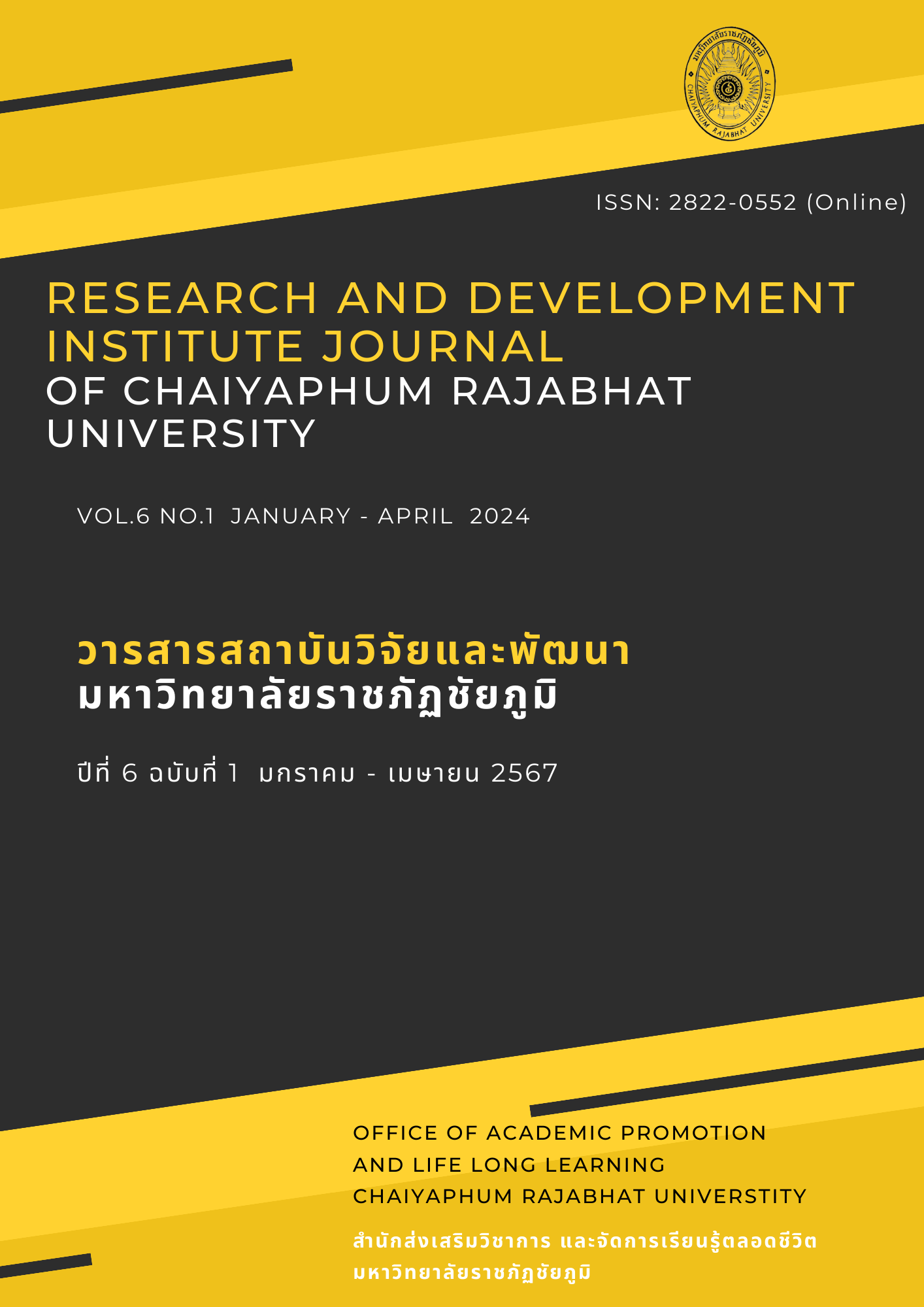EFFECTS OF USING STORYTELLING ON ENGLISH VOCABULARY LEARNING ACHIEVEMENT OF GRADE 6 STUDENTS WITH INTELLECTUAL DISABILITIES
Main Article Content
Abstract
The research objectives of this study were: 1) to investigate the effects of storytelling on English vocabulary learning achievement of grade 6 students with intellectual disabilities; 2) to compare the post-test mean score of grade 6 students’ English vocabulary learning achievement with the criterion score of 50%; and 3) to investigate students’ satisfaction with learning English using storytelling. The participants were 10-grade 6 students with intellectual disabilities from Ubon Panyanukun School, Mueang District, Ubon Ratchathani Province. They were selected by the cluster random sampling technique. The instruments were storytelling lesson plans, an English vocabulary learning achievement test, and a questionnaire. The data were analyzed using mean (), standard deviations (S.D.), Kolmogorov-Smirnov test, t-test, and content analysis.
The results showed that the students’ English vocabulary learning achievement post-test mean score was significantly higher than the pre-test mean score (p < .05).
The students’ English vocabulary learning achievement post-test mean score was significantly higher than the criterion score of 50% (p < .05). Additionally, students had positive satisfaction towards learning English using storytelling ( = 4.82). This study indicated that storytelling approach could effectively enhance students’ English vocabulary learning achievement. While it is limited by the small sample size, there are several opportunities to extend the research. The findings support the use of storytelling to teach vocabulary to English learners with intellectual disabilities.
The research objectives of this study were: 1) to investigate the effects of storytelling on English vocabulary learning achievement of grade 6 students with intellectual disabilities; 2) to compare the post-test mean score of grade 6 students’ English vocabulary learning achievement with the criterion score of 50%; and 3) to investigate students’ satisfaction with learning English using storytelling. The participants were 10-grade 6 students with intellectual disabilities from Ubon Panyanukun School, Mueang District, Ubon Ratchathani Province. They were selected by the cluster random sampling technique. The instruments were storytelling lesson plans, an English vocabulary learning achievement test, and a questionnaire. The data were analyzed using mean (), standard deviations (S.D.), Kolmogorov-Smirnov test, t-test, and content analysis.
The results showed that the students’ English vocabulary learning achievement post-test mean score was significantly higher than the pre-test mean score (p < .05). The students’ English vocabulary learning achievement post-test mean score was significantly higher than the criterion score of 50% (p < .05). Additionally, students had positive satisfaction towards learning English using storytelling (= 4.82). This study indicated that storytelling approach could effectively enhance students’ English vocabulary learning achievement. While it is limited by the small sample size, there are several opportunities to extend the research. The findings support the use of storytelling to teach vocabulary to English learners with intellectual disabilities.
Article Details

This work is licensed under a Creative Commons Attribution-NonCommercial-NoDerivatives 4.0 International License.
Permission to use text, content, images, etc. of publication. Any user to read, download, copy, distribute, print, search, or link to the full texts of articles, crawl them for indexing, pass them as data to software, or use them for any other lawful purpose. But do not use it for commercial use or with the intent to benefit any business. Published under a Creative Commons Attribution-NonCommercial-NoDerivatives 4.0 International License.

This work is licensed under a Creative Commons Attribution-NonCommercial-NoDerivatives 4.0 International License
References
Brown, H. D. & Lee, H. (2015). Teaching by principles. An interactive approach to language pedagogy (4th ed.). New York: Pearson Education.
Hettiarachchi, S., Walisundara, D. C. & Ranaweera, M. (2022). The effectiveness of a multisensory traditional storytelling programme on target vocabulary development in children with disabilities accessing English as a second language: A preliminary study. Journal of Intellectual Disabilities, 26(1), 90-108.
Malderez, A. (2010). Stories in ELT: Telling tales in school. Procedia-Social and Behavioral Sciences, 3, 7-13.
Schmitt, N. (1995). Vocabulary notebooks: Theoretical underpinnings and practical suggestions. ELT Journal, 49(2), 133-143.
Schmitt, N. (2019). Understanding vocabulary acquisition, instruction, and assessment: A research agenda. Language Teaching, 52(02), 261-274.
Schmitt, N. (2000). Vocabulary in Language Teaching. Cambridge: Cambridge University Press.
Shilc, M., Schmidt, M., & Kosir, S. (2017). Pragmatic abilities of pupils with mild intellectual disabilities. Journal of Special Education and Rehabilitation, 18(1-2), 23-27.
Shin, J. K. (2016). Language education for children with mild intellectual disabilities by utilizing digital storytelling. Proceedings of EdMedia 2016--Word Conference on Educational Media and Technology (pp. 52-56). Vancouver: Association for the Advancement of Computing in Education (AACE).
Villaroel, M. (1997). Los cuentos en el aula de Primaria: Teacher Line News, Views, and Things to Do. Madrid: Longman.

